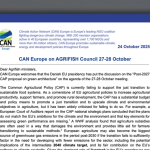In terms of ambition, the results of the European Parliament vote on 15.2.2017 is a clear betrayal of the Paris Agreement.
After strongly voting in support of the Paris Agreement, the European Parliament would have had the opportunity to walk its talk to turn the ETS into an instrument for climate protection but instead they promoted a lock-in of emissions for another 10 years.
- Under the Commission’ proposals the emissions budget of the ETS for 2021-2030 will be inflated by a surplus of about 6-7 billion pollution permits.
- Under the Parliament’s proposal this surplus will be reduced by less than 1 billion.
In the coming months the Parliament, Council, and the Commission will negotiate the final reform proposal.
Summary of results of European Parliament vote
AMBITION
In terms of raising the overall ambition of the ETS, the vote of the European Parliament is a big disappointment:
- The Linear Reduction Factor (LRF) of 2.4%, part of the ENVI report, was not approved. Raising the reduction rate of the cap would have sent a strong signal that the European Parliament is trying to put the ETS on a Paris-consistent pathway.
- In addition, the Parliament rejected an amendment to readjust the starting level in 2021 to actual emissions. This would have eliminated up to 2.4 billion tonnes of surplus allowances, and it is the only measure that would have a substantial impact on the carbon price, which currently lingers at a dramatic 4 to 5 euros per tonne of CO2.
- In terms of cancelling the surplus, 800 million allowances will be cancelled from the Market Stability Reserve (MSR) – a type of bank where surplus allowances are stored temporarily. Furthermore, the amount of surplus allowances on the market going into this MSR was raised, by doubling the intake rate from 12 to 24% of surplus emissions for four years starting in 2019. This is good as it may raise prices but it does not decrease the surplus (it just stores it somewhere else).
- From 2019 onwards, Member States have the option to cancel allowances if they wish to do so. This could decrease the surplus but only if a large enough number of Member States decide to do so with a significant number of their allowances.
CARBON LEAKAGE (free allowances for industry):
- Cement is back on the carbon leakage list: In the plenary vote, a hard won part of the ENVI compromise deal was brutally rejected, with EPP leading on this: A border adjustment mechanism which would have created a level playing field for foreign cement companies exporting to the EU, was rejected. The cement industry will keep receiving free allowances, although they have made millions of windfall profits from selling excess allowances in the last phase.
- A fund for indirect cost compensation will be established. We are against indirect cost compensation because it is another subsidy for energy intensive industry.
- The steel industry will receive more free allowances due to a special provision granted to waste gases and due to the exclusion from the application of the cross-sectoral factor (fertilizers are also excluded).
- Potential lowering of the auction share from 57% to 52% in case industry requires more free allowances than available from the 43%. In case this mechanism is not triggered, or if the full 5% is not needed to compensate industry, up to 200 million additional allowances may be cancelled in 2030. This would slightly reduce the surplus but only in 2030.
FUNDS AND REVENUES:
- Creation of Just Transition Fund, operational as of 2021 to support training initiatives to re-skill workers in carbon-dependent sectors with a below-average GDP. It will be funded by pooling 2% of auctioning revenues.
- A 450 gCO2/kWH eligibility criterion for projects funded through both and the Modernization Fund was maintained, which practically excludes investments in coal and biomass co-firing plants.
- The role of the European Investment Bank in the governance of the Modernization Fund was sustained – instead of giving up control to beneficiary Members States only.
- Greece will not be eligible to receive funds under Art 10c (which they would have used to invets in new coal plants), BUT the base year of the Modernization fund was changed to make Greece eligible (which is only bad if we lose the 450 gCO2/kWH eligibility criterion).
- Unfortunately, no special fund was established for international climate finance.
- Also MEPs voted for 100% of auctioning revenues must be used for climate action which is good but the devil lies in the detail because what constitutes climate action is defined very loosely and includes up to 20% being used for indirect cost compensation which is the opposite of climate action!
BUNKERS
The Parliament has strengthened some details of aviation in the ETS and has for the first time included shipping via an EU Maritime Climate Fund.



